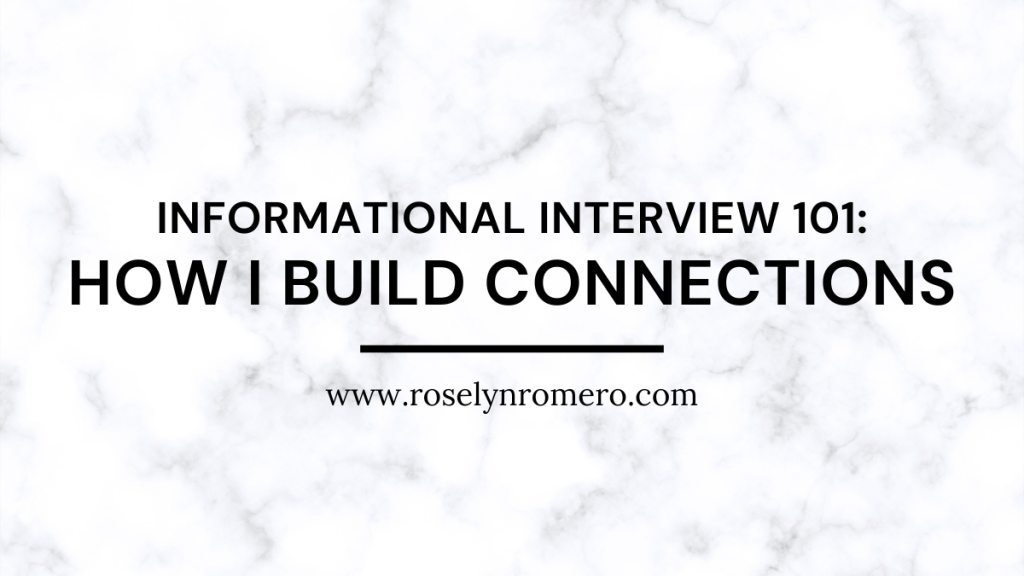Let’s face it: Landing your first internship is hard.
There are countless websites posting hundreds of internship applications and job openings every day. Some internships require applicants to have at least one previous internship experience, some are unpaid and some have extremely vague descriptions of the intern’s responsibilities. It can be overwhelming, especially if you haven’t narrowed your internship or job search or if this is your first time internship- or job-hunting.
While I’ll admit that applying for internships takes patience, plenty of research and a specific set of skills tailored to the position you’re applying for, I’d consider myself very lucky. I was at the right place at the right time and knew the right people, which ultimately led to me being offered a part-time position at my current workplace.
Nonetheless, here are some of my tips that helped me turn my first internship into a job.
Background
If you’re new to my blog, welcome! My name is Roselyn (pronounced ROSE-lin, not RAWZ-lin) and I use she/her/hers pronouns. I’m currently a junior at Cal Poly San Luis Obispo majoring in Journalism and double-minoring in Spanish and Ethnic Studies. I am also involved in the University Honors Program, Pilipino Cultural Exchange (the Filipino club on campus) and I was a former assistant news editor for Mustang News, the student-run news organization at Cal Poly.

For the past year and a half, I’ve worked as the weekend producer at KSBY-TV News in San Luis Obispo. I started as an intern from late June to mid-July in 2019. By the end of July, I was officially hired as a content producer. Essentially, I was interning for three weeks before I received an official job offer.
I understand this is not a common situation for many students, especially if you’re a person of color who does not have any connections in the industry you are interested in pursuing. But that’s why I’m so passionate about helping young students of color land their first internship; it’s a step in the right direction, and your experience as an intern will help you become a standout employee by teaching you what skills are vital for the job and familiarizing you with the work culture.
My Job Duties
No two days in the news industry are the same, but in general, there are two main categories in which I would divide my responsibilities: website and newscast.
Website: As soon as I walk into work on the weekends, I write stories for the KSBY website and schedule and post those stories on our social media platforms (mostly Facebook and Twitter). I also follow breaking news stories as they come via wires, social media and other apps or websites relating to first responders or local police departments (e.g. California Highway Patrol Traffic Incident Information Page, PulsePoint, Lompoc Police Department, etc.) so I can get accurate information from multiple sources. If I need more information from local officials for stories, I’ll also call PIOs and other communications personnel.

Newscast: The best way for me to describe what I do as a producer is to ask that you imagine an entire news show from beginning to end. As a producer, I basically decide which stories go first in the show and which stories will air later; I write what the anchors read on the prompter and the “slugs” of each story and I decide which stories to “kill”/not air for timing. I also give time cues to the weather anchor or other on-air talent via IFB to make sure we end our show on time. Since I mostly produce the weekend shows, I come into work every Friday and plan out which stories our weekend reporter and photographer will be working on. On Fridays, I also call different businesses and organizations in San Luis Obispo and Santa Barbara counties to schedule interviews with our photographer in advance since many employees may not have access to their work phones on the weekends.
Of course, this is a huge oversimplification of my job and this is by no means an exhaustive list of what I do at work. These are just the main responsibilities that take up a “normal” day in the newsroom.
How I Turned My First Internship Into a Job
- Treat your internship as if it were an actual job. When you first enter the doors of the company for which you intern, exude the same confidence you would show if you were newly hired. Dress appropriately. Greet the receptionist at the front desk. Smile and introduce yourself to every single person you meet. Get a sense of the work culture by observing and interacting with the employees. Contribute to meetings, discussions and collaborative projects. Immerse yourself in the work culture so you become part of the company.
- Ask as many questions as you can. As an intern, your primary duty is to learn. Be curious about everything. Ask the employees what their responsibilities entail and what they love and hate about their job. Monitor the various positions in the office and ask how they all work together to make a newscast or another finished product come to life. As soon as a question pops up in your mind, don’t be afraid to ask it. Also, don’t feel embarrassed about not knowing something; all employees start somewhere, and the more questions you ask as an intern, the more terms and skills you’ll be familiar with if/when you start working there as an employee.
- Help out as much as you can. While it can be fun to pick up coffee for the office or carry out other mundane tasks (sorry, coffee interns!), it’s important to continually ask how you can assist others as often as you can. For example, as an intern, I would ask the content producers if they needed help writing their scripts for the show or if any of the reporters needed someone to help set up their live shot or look-lives. Throughout your internship, ask yourself, “What do I want to get out of this experience, and who in this newsroom/office/workplace can help teach me those skills or challenge me to work outside of my comfort zone?”. When you’re interning for a company – especially if it is a company you want to work for in the future – you never want to be caught doing nothing or waiting for tasks to come up. You need to take initiative by actively seeking ways to learn skills around the office and helping the employees at the company. Personally, I wanted to learn about as many roles in the newsroom as I could, but I also wanted to shadow multimedia journalists (MMJs) since my initial goal was to become a reporter. And while I’m not an MMJ right now, I’m grateful for the fact that I already have connections in this industry whom could help me reach that goal in the future.
- Seek mentors. You may find yourself gravitating toward one or multiple people throughout the course of your internship. In the newsroom, those people can be the news director, assignment editor, an MMJ, a photographer, a producer, an engineer or so many others. If you find that you’re learning a lot from them and that they’re always enthusiastic to collaborate with you, ask them if they would be willing to mentor you. Mentors are extremely important, so much so that I could write an entire blog post about seeking mentors! But if you’re new to the concept, having a mentor is akin to having a close friendship with someone who can guide you through your internship/career journey and provide vital job advice, recommend open positions at different companies, connect you with other mentors, write a letter of recommendation for you and so much more. In my experience, I have five mentors whom I can call, text or email any day and ask them for advice.
- Avoid using your cell phone. Unless your internship responsibilities include making calls to people or checking or posting on social media, I’d recommend turning off your cell phone or silencing your notifications. You don’t want to give off the impression that you’re bored at your internship or that you get distracted easily. The only instances in which I would say it’s appropriate to check your phone are if there is an emergency situation that requires your immediate attention and/or your internship manager or coordinator says they are fine with you being on your phone. For those who want to intern in the news industry, it may be OK to use your phone to check news apps and social media for breaking stories.
- Save all of your business cards. Throughout your internship, employees may give you their business cards to stay connected. Keep every single business card you receive, save their names and numbers on your cell phone and, if appropriate, call or text them if you ever have any questions or concerns. Several ways in which I used business cards were to call my internship manager whenever I needed help getting into the building or whenever I saw breaking news happening while I was walking downtown and I wanted to alert someone in the newsroom about it. Eventually, these connections will add up, giving you a set of contacts with whom you can speak if you’re ever curious about future job opportunities, if you want to request a letter of recommendation or even if you need non-work related advice.
- Have your finished portfolio, project or résumé in mind. If you’re interning with a company for academic credit, you might be required to create a portfolio or project at the end of your internship to demonstrate the skills you’ve gained in a visual or creative format. To help your future self, always keep your final portfolio or project in mind throughout your internship. That way, you can assess which activities or skills you should include and how you can make them stand out for your internship adviser. On the flip side, if you aren’t interning for academic credit, you can also think about which specific skills you’d like to include on your résumé at the end of your internship.
- Have a positive attitude. The way you present yourself during your internship can make a world of a difference. Being a productive intern is wonderful, but if your attitude is similar to that of a robot, then, unfortunately, you may not stand out as a potential employee. Greeting others with an authentic smile, being kind to employees and maintaining a humble mindset whenever you make a mistake will help you get your foot in the door and show others how much you enjoy your internship. You always want to present the best version of yourself to those around you without coming off as fake or pretentious.
- At the end of your internship, express your gratitude. On a similar note, showing your gratitude for the chance to intern with the company will also demonstrate your eagerness for future career opportunities. While emails are a good way of expressing your appreciation for the internship, people love receiving handwritten cards, so if you can, write on a thank-you card or make one yourself, and either deliver the card in person or send it via mail in a timely fashion. It’s important to personalize every handwritten card, too, if you are writing to multiple employees, so you may write: “Hi, [name]! Thank you for the opportunity to intern for [company name]. I’m especially grateful for [a specific experience, skill you learned, etc.]. Here is my contact information if you ever want to reach me.” This will look more genuine than writing the same thank-you note to every single person, and expressing your gratitude will help you stand out from other interns who may not do the same.




Leave a comment